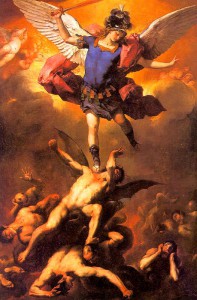
Michael
From a reader…
QUAERITUR:
My daughter asked me if I had heard of an Archangel Uriel. I believe only 3 are named in Scripture and we must be careful about a name that could be an evil spirit. Info online seems to indicate there is a Uriel. Is he really an Archangel?
As you say yourself, from Scripture we know the names of three Archangels: Michael, Gabriel and Raphael. There are other, apocryphal names of angels, but we are not to use them or invoke them.
That said, some Christians, Eastern Orthodox and Anglicans for example, invoke Uriel. Ethiopian Christians, who accept as canonical the Book of Enoch (in which Uriel is mentioned) invoke Uriel. The Catholic Church does not accept Enoch as canonical scripture.
Moreover, a council or synod (“walking together”) held in Rome in 745 with Pope St. Zachary, wanted to curb a growing over-emphasis in the veneration of angels. Therefore, the synod reduced the officially recognized list of angels to Michael,Gabriel and Raphael, thus striking the names of others, found in apocryphal writings, such as Uriel.
So, it may be that Uriel is an Archangel. I know that Michael, Gabriel and Raphael are because the Catholic Church invokes them. We must be careful about all others.


































Yes and the practice of having a “pet name” for one’s guardian angel should be avoided. To name something is to have a kind of custody or authority over it as in Adam’s reaponsibility to name the animals etc. So it doesn’t seem fitting for us to name angels who are superior in intellect and ability to humans. Intetestingly, I believe that requiring the demon to reveal his name is part of the rite of exorcism. So this authority to name the fallen angel is not extended to those countless blessed spirits whose names we do not know.
I read somewhere once, I think, that use of those apocryphal names were formally suppressed by some pope or council – for some reason I’m thinking Paul III or Urban VIII.
And yet…. I know of a beautiful diocesan Catholic church built in the 1920s that has them painted into the reredos with the suppressed names clearly written in giold beneath each. That might be a helpful observation to those inclined to the belief that everything was always perfectly correct “before Vatican II.”
He is also mentioned in 4 Esdras (2 Esdras, the Ezra Apocalypse found in old copies of the Vulgate), which is why he got into Slavonic Orthodox* and Anglican traditions-they have the book in their Bibles (whether as canonical or apocryphal). He appears in chapter 4 and in chapter 10.
We must follow the Church’s decision about what angels to invoke. But the issue does bring up an interesting question: what exactly do we believe about the apocryphal books found in various Bibles? What do we think of the books that were in the Vulgate (3-4 Esdras, Prayer of Manasseh, sometimes Psalm 151) that are not in the Church’s canon? Or what about the other books accepted by the Orthodox, like 3 Maccabees? I know some of them (4 Esdras, Prayer of Manasseh) are quoted in the Liturgy (Requiem aeternam…), but what is the Church saying by quoting them?
*Not sure about Slavonic Catholics or other Eastern Rites as to which canon they use.
Having had various experiences with charismatics, I would like to add the following: If you think you know your Guardian Angel’s name, please don’t invoke it or use it.
At the shrine of Our Lady of Guadalupe in Mexico on Tepayac hill there are statues of the Angels Gabriel, Michael, Raphael and…Uriel. I had heard of Uriel before but never seen him depicted until I visited there.
Literary Fiction Note:
The archangel Uriel was frequently cited (along with the other Three) in Katherine Kurtz’s Deryni series. The context was the ceremonial (conflation of) magical/liturgical rites invoking the “Four Quarters.”
Btw, before any SFNs occur (spittle-flecked-nutties), I’m not advocating the synchronism with pagan elements that became increasingly prevalent as the novels progressed.
A long time ago in my early age Uriel was named as the Angel with the burning sword who stood before the gates of heaven and hell that are next to each other in the spiritual world
AMTFisher, theoretically, the Eastern Catholics (at least the Byzantine Rite ones) use the same canon as their Orthodox counterparts, i.e., the Septuagint. In practice it doesn’t really matter, as the concept of “canon” mostly refers to what may be read in the Liturgy, and the lectionaries of the Eastern Churches don’t really offer any surprises.
As an aside, Psalm 151 is included in the liturgical Slavonic Psaltir, but it is not actually read when kathisma 20 is read at Matins – it’s sort of “semi-canonical.” It may be read when using the Psalter as a prayer rule with the penitential hymns given in the Slavonic tradition, though.
A long time ago I was in a discussion on this very topic about how many angels are mentioned by name in the scriptures. I suggested 4 are named in canonical scripture.
Michael,Gabriel and Raphael and the one that Christ mentions the most.
I’m pretty sure that Eastern Catholics would invoke Uriel. The Melkites, for example, are quite fond of identifying as “Orthodox in communion with Rome.” They accept the entirety of the Byzantine tradition. I would think that for Byzantine Catholics, under the obedience of their bishops and patriarch, this is totally fine. We Latins, on the other hand, must be obedient to our own tradition and invoke only Sts. Michael, Gabriel, and Raphael.
Poor Yorek – I am unfamiliar with those novels but, Uriel and the classic 3 Archangels are invoked as part of the standard rites of ceremonial magic, which is very, very, very dangerous stuff which everyone should stay very far away from.
Pingback: FRIDAY CATHOLICA EDITION | Big Pulpit